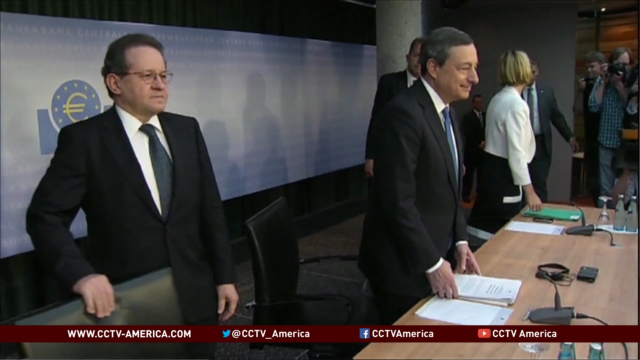Most economists had been expecting an interest rate cut, but the bank went even further than that. CCTV’s Sandra Gathmann has the details from Brussels.

European Central Bank cut interest rates to lowest level
Most economists had been expecting an interest rate cut, but the bank went even further than that. CCTV’s Sandra Gathmann has the details from Brussels.In a surprise move, the European Central Bank cut interest rates to their lowest levels ever and launched a package of measures to boost lending into the still fragile Euro-zone economy. The bank’s deposit rate is now in negative territory meaning lenders will have to pay to hold reserves there.
Mario Draghi, European Central Bank President, said: “In pursuing our price stability mandate, today we decided on a combination of measures to provide additional monetary policy accommodation and to support lending to the real economy.”
E-C-B President Mario Draghi said the moves were needed to combat falling inflation which, at a half percent in May, means the Euro-zone is in danger of a weak recovery. France’s President Francois Hollande, in Brussels for G7 talks with world leaders, shared the same concern.
In an effort to support bank lending to households and non-financial businesses, the E-C-B also revealed its offering long-term loans to commercial banks until 2018.
Earlier CCTV reporter Sandra Gathmann spoke with Guntram Wolff, director of the economic think tank Bruegel — who says the loans will help weaker economies in crisis countries. He said: “It helps some markets that currently are not functioning, in Southern Europe in particular, so it is the right step but it’s not one that will increase the inflation rate of the Euro-zone as a whole, because that is not the problem we are seeing in the core Euro-zone countries like France and Germany.”
But the E-C-B did stop short of large-scale quantitative easing — printing money to buy assets like the U-S Federal Reserve has done — but it did insist it would be prepared to go further, if the risk of further deflation remains.
CCTV’s Phillip Yin is joined by Jacob Kirkegaard, Senior Fellow at the Peterson Institute for International Economics in Washington D.C, to discuss more on European Central Bank interest rates issues.

Jacob Kirkegaard on European Interest Rates
CCTV's Phillip Yin is joined by Jacob Kirkegaard, Senior Fellow at the Peterson Institute for International Economics in Washington D.C, to discuss more on European Central Bank interest rates issues.Meanwhile, U-S President Barack Obama has warned Russia against further meddling in Ukraine during the G7 summit. He hinted at more sanctions for an economy already struggling to stay afloat. That could make his upcoming talks with Russian President Vladimir Putin an unfriendly one.
Wrapping up their summit in Brussels, G7 leaders urged Russia to stop the flow of weapons and militants across the Ukrainian border, and cooperate with the authorities in Kiev.
Barack Obama, U.S. President, stated: “Given its influence over the militants in Ukraine, Russia continues to have a responsibility to convince them to end their violence, lay down their weapons and enter into a dialogue with the Ukrainian government. However, if Russia’s actions continue, it is clear from the G7 leaders here that we are ready to impose additional costs on Russia.”
Additional costs means sanctions, though leaders disagreed over how tough those sanctions should be–with European leaders worried about risks to their own economies.
There was also talk of more political and economic solidarity with Ukraine.
Other big issues were covered, including climate change. Here President Obama unveiled a plan to reduce emissions for U.S. power stations by 30 percent.
Tensions in the South China Sea were also discussed.
In a written statement, the G7 leaders said they opposed any attempt by any country to assert territorial or maritime claims through the use of intimidation in the South China Sea, though they rejected Japan’s reported request to single out China in the communique.
On Syria EU leaders agreed to punish European jihadists engaged in the conflict there.
David Cameron, Britain’s Prime Minister, said: “We have decided to intensify our efforts to address the issue of foreign fighters travelling to and from Syria”.
The decision follows the recent killing of three people at a Jewish Museum in the Belgian capital by a former combatant in that conflict and revelations that more than 30 French fighters have died in Syria.
 CGTN America
CGTN America
